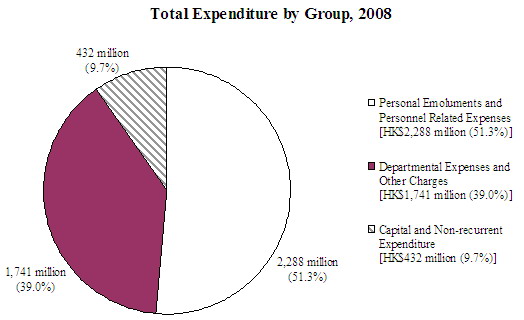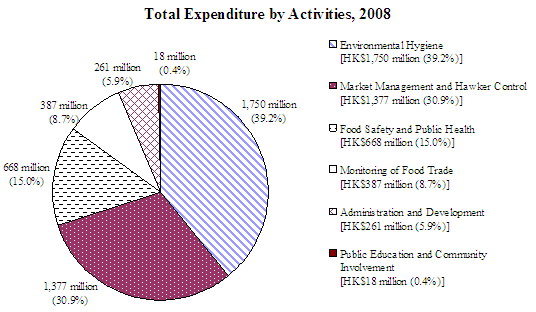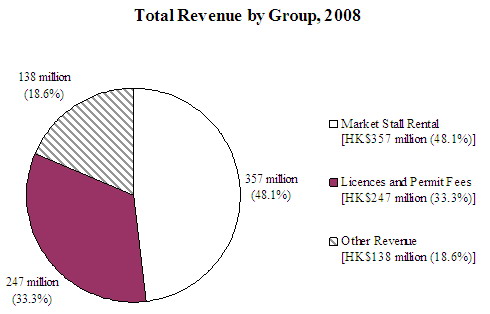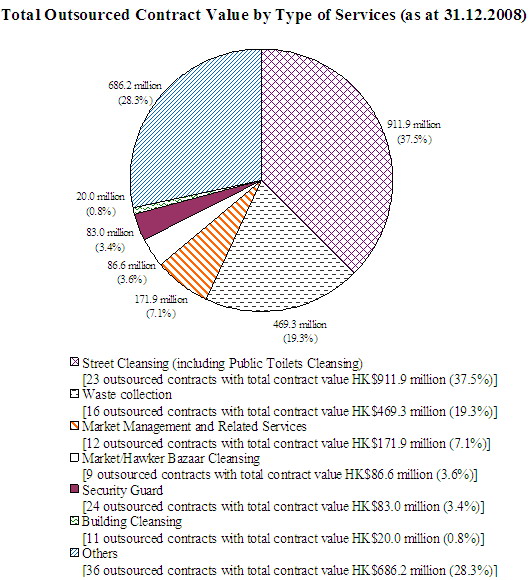The Administration and Development Branch provides various management and support services to the Department.
Grade Management
There are three major grades covering Health Inspectors, Hawker Control Officers and Foremen with two grade managers, one for the Health Inspector grade and another for the Hawker Control Officer and Foreman grades. The grade managers are responsible for staff matters involving manpower planning, career development, postings, promotion and training.
Health Inspectors are responsible for various environmental hygiene and food safety functions, such as handling of environmental nuisance cases, licensing, prosecution, meat inspection, cleansing services, outsourcing, pest control, hawker control, management of markets, cemeteries and crematoria, food control and health education.
Hawker Control Officers are responsible for controlling on-street hawking activities, managing hawker permitted places and taking law enforcement action against illegal hawking activities. They also play an important part in prosecuting people committing cleanliness offences, such as littering and spitting.
Foremen are mainly responsible for supervising the work of minor staff in market management, street cleansing, waste collection and pest control, and monitoring the performance of the Department's service contractors. Members of the grade also take legal action against cleanliness offenders.
Training
Training and development aim at enhancing the overall competence of staff and bringing out their best to serve the public. Training programmes are organised to support departmental initiatives, enhance staff professionalism and capability to keep pace with changing demands, heighten awareness of occupational safety and health and prepare staff for career development. Training programmes mainly take the form of vocational, management, information technologies, occupational safety and communication courses, held locally and overseas. In 2008, the Department organised and co-ordinated 497 classes attended by 10,704 trainees, and adding up to a total of 28,173 trainee-days.
During the year, induction courses for Foreman and Assistant Hawker Control Officer were redesigned with a view to helping some 140 new recruits to be equipped with the necessary competence to discharge their duties. In addition, the Department provided full or partial financial sponsorship to 54 staff members to pursue employment related studies held outside office hours, and 64 officers were placed in 46 training programmes outside Hong Kong, involving 497 trainee-days.
Management Services
Management consultancy and statistical services essentially make up the work of Management Services. They help management improve the delivery of public services, monitor the standard of performance and formulate policy in the provision of services and staffing. Ongoing consultancies are provided to assist the Department in the implementation of recommendations of studies and technical advice is offered to help the Department to conduct statistical surveys and analyse data.
Three management studies were completed during the year. In addition, a number of statistical surveys were conducted on issues such as public satisfaction on the Department's services or facilities as well as public's attitude to food safety and nutrition labelling.
Financial Management



Note: Figures may not add up to 100% due to rounding.
All matters relating to expenditure and procurement, including payment processing, financial advice and monitoring, are handled by the Finance and Supplies Division.
In 2008, the Department spent $4,461 million, including $2,288 million on salaries and allowances and personnel related expenses, $1,741 million on departmental expenses and other charges, and $432 million on capital and non-recurrent expenditure.
By activities, the majority of the expenditure ($1,750 million) was on environmental hygiene. This was followed by $1,377 million on market management and hawker control, $668 million on food safety and public health, $387 million on monitoring the food trade, $261 million on administration and development, and $18 million on public education and community involvement.
In 2008, the Department received a revenue of $742 million. Most of the revenue came from the rental of stalls in public markets managed by the Department ($357 million) and from licence and permit fees ($247 million). Other sources included revenue from cemeteries and crematoria services ($62 million), meat examination ($21 million) and miscellaneous services ($55 million).
Capital Works
In the Government's 2008 Capital Works Resource Allocation Exercise, the five-year allocation on food and environmental hygiene services capital projects is estimated at $2,498 million. Of the total allocation, about $626 million is to meet expenditure on projects under construction or completed with outstanding accounts, while $1,872 million has been earmarked for new projects.
Markets
Two new markets, Aldrich Bay Market and Wan Chai Market, were opened in August and September respectively.
During the year, general improvement works to Yeung Uk Road Market were completed. General improvement works to Tsuen Wan Market, Wing Fong Street Market, Sheung Wan Market, Po On Road Market and Cooked Food Centre, Fa Yuen Street Market and Cooked Food Centre, Tung Yick Market and Lam Tei Market are in progress.
General improvement works to Sai Kung Market are at the planning stage.
Refuse Collection Points
As part of the continuing efforts to improve Hong Kong's living environment, the Department is replacing temporary roadside refuse collection points (RCPs) with off-street facilities in enclosed buildings equipped with modern de-odourising installations. The reconstruction of the RCP at Tat Yan Square in Tuen Mun was completed during the year.
Public Toilets
Four new public toilets were completed in 2008, namely: Ma Liu Shui Waterfront Public Toilet, Fo Yin Road Public Toilet, Lo Wai Road Public Toilet and Tat Tung Road Public Toilet.
Under the Public Toilet Refurbishment/Improvement Programme, nine projects were completed in 2008 and another 61 are in progress or being planned.
To continue the programme to convert all aqua privies into flushing toilets by 2012-13, works for 24 out of the 50 aqua privies, which commenced in November 2007 for completion by May 2009, were completed in 2008. Works for another 80 aqua privies also commenced in November 2008 for completion by mid-2010.
Cemeteries and Crematoria
Provision of some 3,300 niches at Kwai Chung Columbarium was completed in 2008. Reprovisioning of Diamond Hill Crematorium (Phase II) involving the provision of two service halls and ancillary facilities as well as the construction of an additional columbarium at Diamond Hill providing 18,500 niches will be completed in early 2009. Planning is underway for the reprovisioning of Wo Hop Shek and Cape Collinson Crematoria, construction of a columbarium and a garden of remembrance at Kiu Tau Road in Wo Hop Shek, and reprovisioning of Diamond Hill Garden of Remembrance.
Outsourcing of Services

By the end of 2008, 131 contracts valued at $2,428.8 million were in force for the provision of services by private contractors. The outsourcing policy is aimed at greater cost-effectiveness and efficiency in the delivery of services.
Examples of outsourcing services include: street cleansing, waste collection, mechanical street sweeping, mechanical gully cleansing, collection of recyclables, market/hawker bazaar cleansing, market management and related services, pest control services, building cleansing, security guard services, animal carcass collection, cleansing and undergrowth cutting services for cemeteries and columbaria, etc.
Measurable performance standards are written into contracts to ensure the quality of services provided. Protective clauses have also been included in tenders to safeguard the rights and benefits of non-skilled workers. In addition to daily checking, supervisory checks are conducted to ensure compliance by contractors.
Complaints Management
The Complaints Management Section is responsible for formulating and reviewing policies on, and procedures for, handling all types of complaints. In 2008, the Department received 159,100 requests or referrals, the vast majority of which were for seeking information or service. Staff or operation-related complaints constituted a small percentage of the total number of requests received.
Quality Assurance
Continuous improvement is one of the priority tasks of the Department to ensure provision of quality services to the public.
The Quality Assurance Section is mainly responsible for conducting day-to-day regulatory inspections on services provided by the Department and service contractors. Recommendations are made for improvements to services with identified inadequacies in existing operational systems, procedures and guidelines. The section also recommends good performers for Quality Assurance Awards and Certificates of Meritorious Performance to motivate outstanding and hardworking front-line staff. In addition, the section investigates staff-related cases of dereliction of duty and employment-related complaints of service contractors in an independent, objective and fair manner.
Public Education and Publicity
Public education plays an important role in almost all the Department's activities and initiatives, forming part of an integrated approach to ensuring food safety and improving environmental hygiene. To this end, the Department organises publicity and educational programmes, and arranges exhibitions, outreaching programmes and seminars to enhance the awareness of the general public on these issues.
The Department operates a Communication Resource Unit at the Fa Yuen Street Municipal Services Building and a Health Education Exhibition and Resource Centre inside Kowloon Park.
The Health Education Exhibition and Resource Centre provides group visits and guided tours to schools, elderly centres, children and youth centres, organisations for the disabled and the public. Seminars, talks and outreaching activities are also conducted regularly. During the year, the centre attracted 124,901 visitors, and organised 1,075 talks-cum-activities for kindergartens, primary schools and secondary schools, 962 talks for elderly centres and 335 talks for the general public. The Mobile Education Centre (publicity vehicle) of the centre visited over 220 schools, housing estates and public parks in 2008 in promoting public health and environmental hygiene messages.
On food safety, various publicity and educational programmes were organised for the food trade and the public on nutrition labelling, genetically modified food, the HACCP (Hazard Analysis and Critical Control Point) system, risk perception, and other food safety initiatives and new regulations. Food safety educational programmes were specially organised for the caterers of the 2008 Olympic and Paralympic Equestrian Events. In 2008, the theme of publicity activities was Five Keys to Food Safety. A wide variety of activities were conducted to promote the message.
To cater for the specific needs of the food trade, seminars on restaurant licensing were arranged on a bi-monthly basis for those who applied for licences for food premises or considered starting a food business.
In 2008, the Department continued its publicity efforts on disseminating environmental hygiene messages through television and radio Announcements in the Public Interest, banners, posters, pamphlets and leaflets. Anti-rodent and anti-mosquito campaigns were organised to solicit public support and participation in controlling pests. Support was also given to cleansing campaign/work by non-government organisations.





